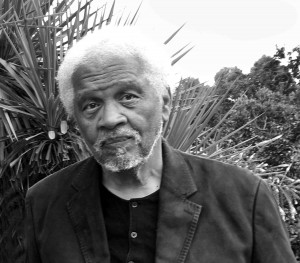On Saturday, July 3, contributors to the anthology Black Hollywood unChained, edited by Ishmael Reed, Third World Press, will discuss their contributions: Cecil Brown, Dr. Halifu Osumare, Ishmael Reed, Jesse Allen Taylor and Marvin X.
Image may be NSFW.
Clik here to view.

Cecil Brown is a writer and actor, known for the film Which Way Is Up? (1977), Horror Vacui (1984) and Doctor Dracula (1978). His most famous novel is The Life and Loves of Mr. Jiveass Nigger; his biography of Richard Pryor is Kiss My Rich, Happy, Black Ass. Another work is Hey, Dude, What Happened to my Black Studies?
Image may be NSFW.
Clik here to view.

Dr. Halifu Osumare is currently Professor of African American and African Studiesat University of California, Davis. She was the Director of AAS from 2011-2014, has been a dancer, choreographer, arts administrator, and scholar of black popular culture for over thirty years.
Image may be NSFW.
Clik here to view.

Ishmael Reed is a prize-winning essayist, novelist, poet and playwright. He taught at the University of California-Berkeley for thirty-five years, as well as at Harvard, Yale and Dartmouth. Author of more than twenty-five books, he is a member of Harvard’s Signet Society and Yale’s Calhoun Society. He lives in Oakland, California.
Douglas Allen Taylor’s first novel,“Sugaree Rising,” was released by Freedom Publishers of San Francisco. He is a journalist who has written for many Bay Area publications.
Image may be NSFW.
Clik here to view.
Clik here to view.

San Francisco Public Library, Koret Auditorium, Saturday, July 3, 2016, 1:30-3:30PM. 100 Larkin Street, Civic Center, San Francisco.
This event is co-presented by the African-American Center of the San Francisco Public Library and the Before Columbus Foundation.
About the Book
In Black Hollywood Unchained, Ishmael Reed gathers an impressive group of scholars, critics, intellectuals, and artist to examine and respond to the contemporary portrayals of Blacks in films. Using the 2012 release of the film Django Unchained as the focal point of much of the discussion, these essays and reviews provide a critical perspective on the challenges facing filmmakers and actors when confronted with issues on race and the historical portrayal of African American characters. Reed also addresses the black community’s perceptiveness as discerning and responsible consumers of film, theatre, art, and music.
Twenty-eight contributors including this book’s editor, Ishmael Reed, offer insightful, informed and provocative points of view on the ever changing, yet unchanged, landscape of Hollywood and film production in America. While the 2012 release of Django Unchained was the film that generated nation-wide conversations and many of the essays in this collection, this book intentionally extends that dialogue about race, history, entertainment and the image of Blacks on the screen to include an examination of the culture of contemporary films and television. Black Hollywood Unchained is critical of the roles of actor, film-maker and viewer as it asks questions that redirect our thinking about the multi-billion dollar industry we call “the movies.”
Contributors
J. Douglas Allen-Taylor, Houston A. Baker Jr., Amiri Baraka, Playthell G. Benjamin, Herb Boyd, Cecil Brown, Ruth Elizabeth Burks, Art T. Burton, Stanley Crouch, Justin Desmangles, Lawrence DiStasi, Jack Foley, David Henderson, Geary Hobson, Joyce A. Joyce, Haki R. Madhubuti, C. Liegh McInnis, Tony Medina, Alejandro Murguía, Jill Nelson, Halifu Osumare, Heather D. Russell, Hariette Surovell, Kathryn Waddell Takara, Jerry W. Ward Jr., Marvin X, Al Young
About the Book
In Black Hollywood Unchained, Ishmael Reed gathers an impressive group of scholars, critics, intellectuals, and artist to examine and respond to the contemporary portrayals of Blacks in films. Using the 2012 release of the film Django Unchained as the focal point of much of the discussion, these essays and reviews provide a critical perspective on the challenges facing filmmakers and actors when confronted with issues on race and the historical portrayal of African American characters. Reed also addresses the black community’s perceptiveness as discerning and responsible consumers of film, theatre, art, and music.
Twenty-eight contributors including this book’s editor, Ishmael Reed, offer insightful, informed and provocative points of view on the ever changing, yet unchanged, landscape of Hollywood and film production in America. While the 2012 release of Django Unchained was the film that generated nation-wide conversations and many of the essays in this collection, this book intentionally extends that dialogue about race, history, entertainment and the image of Blacks on the screen to include an examination of the culture of contemporary films and television. Black Hollywood Unchained is critical of the roles of actor, film-maker and viewer as it asks questions that redirect our thinking about the multi-billion dollar industry we call “the movies.”
Contributors
J. Douglas Allen-Taylor, Houston A. Baker Jr., Amiri Baraka, Playthell G. Benjamin, Herb Boyd, Cecil Brown, Ruth Elizabeth Burks, Art T. Burton, Stanley Crouch, Justin Desmangles, Lawrence DiStasi, Jack Foley, David Henderson, Geary Hobson, Joyce A. Joyce, Haki R. Madhubuti, C. Liegh McInnis, Tony Medina, Alejandro Murguía, Jill Nelson, Halifu Osumare, Heather D. Russell, Hariette Surovell, Kathryn Waddell Takara, Jerry W. Ward Jr., Marvin X, Al Young

